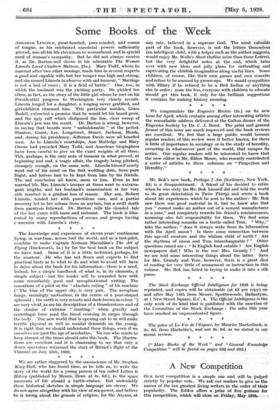Some Books of the Week ABRAHAM LINCOLN, great-hearted, pure-minded, and
coarse of tongue, as his celebrated' anecdotal powers sufficiently proved, was all his life chivalrous to womanhood, and in special .need of woman's sympathy. But he did not -always receive it, as Dr. Barton well shows in his admirable The Women Lincoln Loved (Andrew Melrose, 21s.). Mary Todd, whom he married after two other wooings, made him in several respects a good and capable wife, but her temper was high and strong, and she caused Lincoln to observe with sad humour, " Marriage is not a bed of roses ; it is a field of battle." One, too, in which the husband was the yielding party. He yielded too often, in fact, as the story of the little girl whom he met on his Presidential progress to Washington very clearly reveals. Lincoln longed for a daughter, a longing never gratified, and girl-children charmed him. This particular maiden, Grace Bedell, extracted a promise that he would let his beard grow, and the ugly ruff which disfigured the fine, clear sweep of Lincoln's jaw was the result. Dr. Barton is wrong, however, in saying that beards were unfashionable " at the -period. Stanton, Grant, Lee, Longstreet, Stuart, Jackson, Meade, and, during his presidency, Jefferson Davis were all bearded men. As. to Lincoln's courtships, Ann Rutledge and Mary Owens had preceded Mary Todd, and American biographers have been careful to give us the exact weights of all three. This, perhaps, is the only note of humour in what proved, at
beginning and end, a tragic affair, the tragedy being pitched, strangely enough, on the same note. Lincoln himself nearly went out of his mind on the first wedding date, from pure fright, • and knives had to be kept from him by his friends. The sad conclusion all know, more or less. Even in her married life, Mrs. Lincoln's temper at times went to extrava- gant lengths, and her husband's assassination at her very side resulted in a gradual loss of reason. Her son, Robert Lincoln, tended her with punctilious care, and a partial recovery led to her release from an asylum, but a swift death from paralysis followed. Dr. Barton tells the clouded tale
of the last years with taste and restraint. The book is illus- trated by many reproductions of scenes and groups having connexion with Lincoln's story.








































 Previous page
Previous page